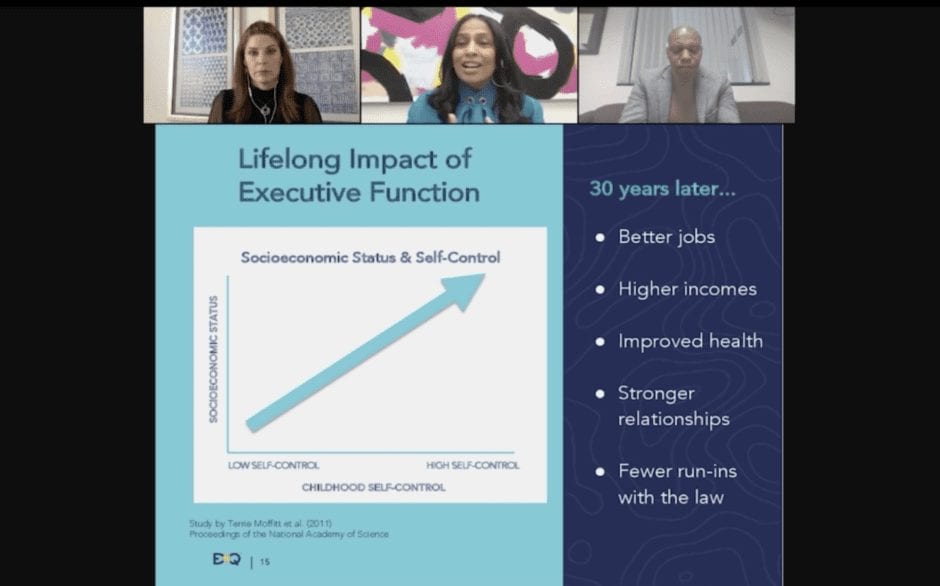Improving Social-Emotional Learning by Teaching Executive Function
By Robert Low
WATCH THE EDLEADER PANEL RECORDING
While teaching students about social skills and emotions has become widespread and proven especially helpful during the pandemic, less attention has been paid to the ability to adjust emotions, thoughts, and actions in response to changing environments and challenging times, which is known as “executive function.”
During a recent edWeb edLeader Panel, sponsored by ExQ® for School, the importance of teaching executive function and its integration with social-emotional learning (SEL) were discussed by Sucheta Kamath, Founder and CEO of ExQ®, Meredith Campbell, Senior Partnership Director for ExQ®, and Dr. Ralph Simpson, Deputy Superintendent of Clayton County Schools in Georgia.
The educational benefits of teaching executive function include improving students’ ability to work collaboratively, as well as pay attention, plan, organize, and problem solve, so they can comprehend complex subject matter and respond to it effectively.
Understanding Executive Function and Its Impacts
Kamath defined executive function as a set of mental processes that connect past experiences to present goals, and which can be used to create strategies that help students manage their academic work and relationships. She also described it as the adaptive ability to regulate oneself based on a knowledge of “who I am, my strengths and challenges, and ways to change in order to achieve my goals.”
In school, teaching executive function is likely to result in more self-directed students, who can learn from their mistakes, pivot, and re-engage with the subject matter and other people. Executive function also helps students integrate diverse perspectives into a meaningful whole, make good decisions, and become more empathetic collaborators who can contribute to a cooperative culture.
Research has shown that there is a strong correlation between executive function and learning a subject such as math, which in the upper grades requires the application of problem-solving skills. Students with executive function are better able to shift strategies and hold onto facts during math operations, so teaching executive function in conjunction with math skills can be one way to help close the “math gap” for certain types of students.
Students with weak executive function are more likely to lack critical thinking, problem-solving skills, motivation, and interest, and so may be capable, but underperforming, students. They are also more likely to be disruptive for a variety of reasons, including impulsivity, difficulty with transitions, and an inability to monitor themselves and self-correct.
Integrating Executive Function with SEL
Dr. Simpson sees the teaching of executive function as an important addition to the extensive SEL initiative already underway in his district’s schools. He believes executive function skills should be taught early on through a “marriage” with SEL so that students have as many tools and resources as possible.
Dr. Simpson emphasized the importance of SEL and executive function in supporting student engagement, and especially during the pandemic, the need to focus on relationships as well as rigor and compassion along with content. His district now has student engagement specialists working in schools, where they serve as “relationship experts” who can help students, teachers, and parents work more effectively.
The teaching approach both he and Kamath recommend for executive function is similar to that used with other types of skills. After a baseline assessment identifies strengths and weaknesses, there should be explicit and systematic instruction, with metrics used to monitor progress and inform teaching. And, after guided practice, a final assessment should evaluate students’ abilities to apply their executive function skills to new situations, as part of their demonstration of mastery.
Another important part of the process that Dr. Simpson identified is teacher buy-in, which needs to start with honest conversations rather than top-down orders, and lead to daily practice that includes the modeling of self-management and good decision making. This should become an ongoing process in which administrators continue to meet with and hear from the people doing the work so there is continuous improvement and everyone understands the difference it is making for the students.
As Dr. Simpson put it, “Teachers need to believe it’s best for children, and if they do, it’s going to work.”
This edWeb broadcast was sponsored by ExQ® for School
WATCH THE EDLEADER PANEL RECORDING
About the Presenters
Sucheta Kamath is a speech-language pathologist, TEDx speaker, graduate of Leadership Atlanta, and an entrepreneur whose new software ExQ® just launched in the edtech space. Sucheta is the founder of ExQ®, a patented research-informed system designed to enhance executive function through game-based personalized training. The exclusive ExQ® curriculum prompts thinking to ignite processes essential for academic, emotional, and social well-being. Through the strengthening of executive functioning, ExQ® develops skills core to your students’ success in academics, in sports, in the arts, and in relationships. Sucheta’s program of interactive games teaches students to learn HOW to learn, empowering the whole child to achieve their maximum potential in school, at home, and in life, and do it with all they’ve got. Learn more about ExQ® at www.ExQInfiniteKnowHow.com.
Cerebral Matters® is Sucheta’s well-established private practice in Atlanta where she evaluates and treats executive function skills in individuals with various developmental and acquired neurological disorders. She is highly specialized in retraining the brain and is a recipient of multiple professional achievement awards for developing many distinct, creative, and process-specific training programs designed to target the mastery of executive function, attention, memory, higher-order cognition, and self-regulation. Learn more about Cerebral Matters® at www.CerebralMatters.com.
Sucheta is also the host of the podcast Full PreFrontal®: Exposing the Mysteries of Executive Function, which is a wonderfully curated resource for educators, professionals, students, and parents where her invited guests range from neuroscientists, researchers, educators, learning specialists, practitioners, and even thought leaders. Learn more about Full PreFrontal® at www.FullPreFrontal.com.
Meredith Campbell is Senior Partnership Director for ExQ, focusing on expanding and growing ExQ’s brand recognition and footprint within the academic community. Meredith brings an extensive background in both sales and education to the ExQ team. Most recently she served various roles with Project Lead The Way, a national STEM curriculum and professional development company. After starting as a director of school engagement for the West region, she moved to Senior Director of the Partnership Team where she spearheaded the expansion of their professional development programming in the higher education realm and collaborated on new product development.
Prior to PLTW, Meredith worked as the regional partnership manager for Reading In Motion, a nonprofit literacy program based out of Chicago. She helped pilot, manage, and successfully grow the company’s first expansion project in Las Vegas as part of a national development plan.
Meredith has an extensive background in the education vertical. She previously operated an independent education consulting group in North Georgia focused on achieving and maximizing student success. This was preceded by serving as an education program specialist in a Metro Atlanta School District after starting her career as a classroom teacher and team lead, holding dual teaching certificates in both special education and general education, as well as a reading endorsement.
Meredith earned her teacher certification and a B.A. in journalism and public relations from Georgia State University.
Dr. Ralph Simpson received his bachelor’s and master’s degrees from the University of West Georgia and a Doctorate of Education in supervision and leadership at the University of Sarasota. Dr. Simpson started his educational career in 1991 as a teacher in the DeKalb County School System and was quickly promoted to Assistant Principal, Principal and Regional Superintendent. In July of 2017, Dr. Simpson was appointed Deputy Superintendent for the Division of School Leadership and Improvement for Clayton County Public Schools. A proponent of restorative practices in education, Dr. Simpson brings a wealth of knowledge. His goal is to align resources that address the social, emotional, and intellectual needs of learners, which will in turn produce students who are globally competitive and college and career ready. Dr. Simpson is a graduate of Howard University’s Urban Superintendents’ Academy and is certified in trauma and resilience.
Join the Community
The Brain and Learning is a free professional learning community on edWeb.net where educators, scientists, and academics can collaborate on the science behind the brain and learning to improve student achievement.

Empower your schools, teachers, staff, and students today by learning more about our patented, digital instructional curriculum that helps students build Executive Function to increase self-advocacy and unlock their learning potential.
Robert Low has more than 30 years of educational publishing experience, ranging from editing and product management to online advertising and content development. He also works with edWeb.net to write articles on their professional learning edWebinars.




Comments are closed.